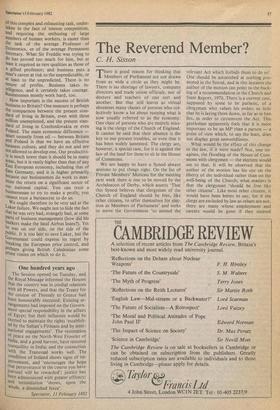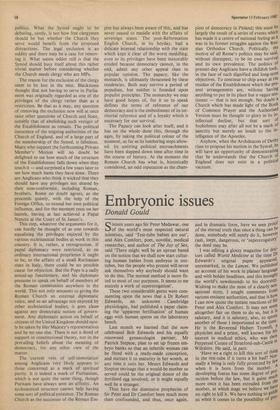The Reverend Member?
C. H. Sisson
'There is good reason for thinking that 1 Members of Parliament are not drawn from as wide a circle as they might be. There is no shortage of lawyers, company directors and trade union officials, nor of doctors and teachers of one sort and another. But that still leaves as virtual absentees many classes of persons who col- lectively know a lot about running what is now usually referred to as the economy. One class of persons who are entirely miss- ing is the clergy of the Church of England. It cannot be said that their absence is the key to our present troubles, or even that it has been widely lamented. The clergy are, however, a special case, for it is against the law of the land for them to sit in the House of Commons.
We are happy to have a Synod always anxious to put things right. On the list of Private Members' Motions for the meeting next week there is one to be moved by the Archdeacon of Derby, which asserts 'That this Synod believes that clergymen of the Church of England should be free, like other citizens, to offer themselves for elec- tion as Members of Parliament' and seeks to move the Government 'to amend the relevant Act which forbids them to do so'. One should be astonished at nothing pro- moted in the Synod, and in this instance the author of the motion can point to the back- ing of a recommendation in the Church and State Report, 1970. There is a current case, supposed by some to be pathetic, of a clergyman who values his orders so little that he is laying them down, as far as in him lies, in order to circumvent the Act. This gentleman apparently feels that it is more important to be an MP than a parson — a point of view which, to say the least, does not display great unworldliness.
What would be the effect of this change in the law, if it were made? Not, one im- agines, the flooding of the House of Com- mons with clergymen — the electors would see to that. It will be observed that the author of the motion has his eye on the liberty of the individual rather than on the well-being of the Church; what matters is that the clergyman 'should be free like other citizens'. Like most other citizens, it would have been better to say, for if the clergy are excluded by law as others are not, there are many whose employment and careers would be gone if they entered politics. What the Synod ought to be debating, surely, is not how free clergymen should be but whether the Church they serve would benefit from the proposed distractions. The legal exclusion is an oddity and there may be a case for remov- ing it. What seems odder still is that the Synod should busy itself about this rather trivial matter before considering whether the Church needs clergy who are MPs.
The reason for the exclusion of the clergy seem to be lost in the mist. Blackstone thought that not having to serve in Parlia- ment was originally regarded as one of the privileges of the clergy rather than as a restriction. Be that as it may, any question of removing the exclusion now will at once raise other questions of Church and State, notably that of abolishing such vestiges of the Establishment as remain. The political innocence of the reigning authorities of the Church of England, and of a large part of the membership of the Synod, is fabulous. Many who support the forthcoming Private Member's Motion will no doubt be delighted to see how much of the structure of the Establishment falls down when they touch it — and surprised a few years later to see how much harm they have done. There are Anglicans who think it wicked that they should have any privileges not shared by their non-conformist, including Roman, brothers. Rome no doubt agrees, as she proceeds quietly, with the help of the Foreign Office, to extend her own political influence, and for the moment rests on her laurels, having at last achieved a Papal Nuncio at the Court of St James's.
This step, whatever the arguments for it, can hardly be thought of as one towards equalising the privileges enjoyed by the various ecclesiastical bodies at work in this country. It is, rather, a retrogression. If papal diplomacy were restricted, as on ordinary international proprieties it ought to be, to the affairs of a small Ruritanian state in Italy, there could he no possible cause for objection. But the Pope is a sadly mixed-up functionary, and his diplomats presume to speak on behalf of members of the Roman communion anywhere in the world. This not only amounts to giving the Roman Church an external diplomatic voice, and so an advantage not enjoyed by other ecclesiastical bodies; it goes clean against any democratic notion of govern- ment. Any diplomatic action on behalf of citizens of the United Kingdom should sure- ly be taken by Her Majesty's representatives and by no one else, There is not a shred of support in constitutional theory, nor in the prevailing beliefs about the meaning of democracy, for any other view of the matter.
The current vein of self-immolation among Anglicans very likely appears to those concerned as a mark of spiritual purity. It is indeed a mark of Puritanism, which is not quite the same thing, though Puritans have always seen an affinity. An ecclesiastical structure cannot help having some sort of political existence. The Roman Church as the successor of the Roman Em-
pire has always been aware of this, and has never ceased to meddle with the affairs of sovereign states. The post-Reformation English Church, in its heyday, had a delicate internal relationship with the state which kept it clear of the worst meddling; even so its privileges have been inexorably eroded because democracy cannot, in the end, admit any other appeal than to popular opinion. The papacy, like the monarch, is ultimately threatened by these tendencies. Both may survive a period of populism, but neither is founded upon populist principles. The monarchy we may have good hopes of, for it so to speak defines the terms of reference of our democracy and is the embodiment of its ter- ritorial reference and of a loyalty which is necessary for our survival.
The Papacy can look after itself, and it has on the whole done this, through the ages, by taking the political colour of the moment, as far as its lumbering steps allow- ed. Its untiring political encroachments have been slapped down time after time in the course of history. At the moment the Roman Church has what is, historically considered, an odd reputation as the cham- pion of democracy in Poland; this must be largely the result of a series of events which has made it a centre of national feeling as it was in its former struggles against the Rus- sian Orthodox Church. Politically, the motive of all Rome's politics may be said, without disrespect, to be its own survival and its own prevalence. The politics of present-day Anglicans have a childish look, in the face of such dignified and long-term objectives. To continue to chip away at the residue of the Establishment which the pre- sent arrangements are, without having anything to put in its place but a vague sen- timent — that is not enough. No doubt a Church which has made light of the Book of Common Prayer and the Authorised Version must be thought to glory in its in' tellectual decline, but that sort of foolishness may after all not be a mark of in- telligence but merely an insult to the n- telligence of the Apostles.
Anyhow, when the Archdeacon of DerbY rises to propose his motion in the Synod, he will have an opportunity of demonstrating that he understands that the Church of England does not exist in a political vacuum.











































 Previous page
Previous page